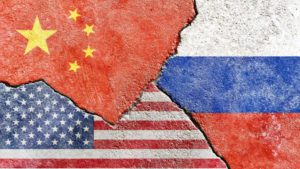In Foreign Policy, Matthew Kroenig, deputy director of the Atlantic Council’s Scowcroft Center for Strategy and Security, makes the case that America, Russia, and China are on an inevitable collision course. He writes:
The free world is recognizing that it is too economically dependent on its enemies in Moscow and Beijing, and it is decoupling as fast as it can. Western corporations pulled out of Russia overnight. New legislation and regulations in the United States, Europe, and Japan are restricting trade and investment in China. It is simply irrational for Wall Street to invest in Chinese technology companies that are working with China’s People’s Liberation Army to develop weapons intended to kill Americans.
But China is also decoupling from the free world. Xi is prohibiting Chinese tech firms from listing on Wall Street, for example, because he doesn’t want to share proprietary information with Western powers. The economic interdependence between the liberal and illiberal worlds that has served as a ballast against conflict is now eroding.
Democratic peace theory says democracies cooperate with other democracies. But the central fault line in the international system today, as Biden explains, is “the battle between democracy and autocracy.”
To be sure, the United States still maintains cordial relations with some nondemocracies, such as Saudi Arabia. But the world order is increasingly divided with the United States and its status quo-oriented democratic allies in NATO, Japan, South Korea, and Australia on one side and the revisionist autocracies of China, Russia, and Iran on the other. One does not need a stethoscope to detect the echoes of the free world’s conflict against Nazi Germany, fascist Italy, and imperial Japan.
Iranian, Russian, and Chinese warships participate in a joint military drill in the Indian Ocean on Jan. 21.IRANIAN ARMY OFFICE/AFP VIA GETTY IMAGES
Finally, constructivist arguments about the pacifying effects of global norms were always plagued with doubts about whether these norms were truly universal. As China engages in genocide in Xinjiang and Russia issues bloodcurdling nuclear threats and castrates prisoners of war in Ukraine, we now have our gruesome answer.
Moreover, constructivists might note that the democracy versus autocracy cleavage in international politics is not simply an issue of governance but of ways of life. The speeches and writings of Xi and Putin are often ideological rants about the superiority of autocratic systems and the failings of democracy. Like it or not—we are back in a 20th-century contest over whether democratic or autocratic governments can better deliver for their people, adding a more dangerous ideological element to this competition.
Fortunately, there is some good news. The best understanding of international politics may be found in a combination of theories. Much of humanity prefers a liberal international order, and this order is only made possible by the realist military power of the United States and its democratic allies. Moreover, 2,500 years of theory and history suggest that democracies tend to win these hard-power competitions and autocracies flame out disastrously in the end.
Unfortunately, the clarifying moments that bend history in an arc toward justice often only emerge after major-power wars.
Let’s hope that today’s incoming students are not reminiscing at their graduation ceremonies about where they were when World War III began. But IR theory gives us plenty of reasons to be concerned.
Read more here.
If you’re willing to fight for Main Street America, click here to sign up for my free weekly email.





